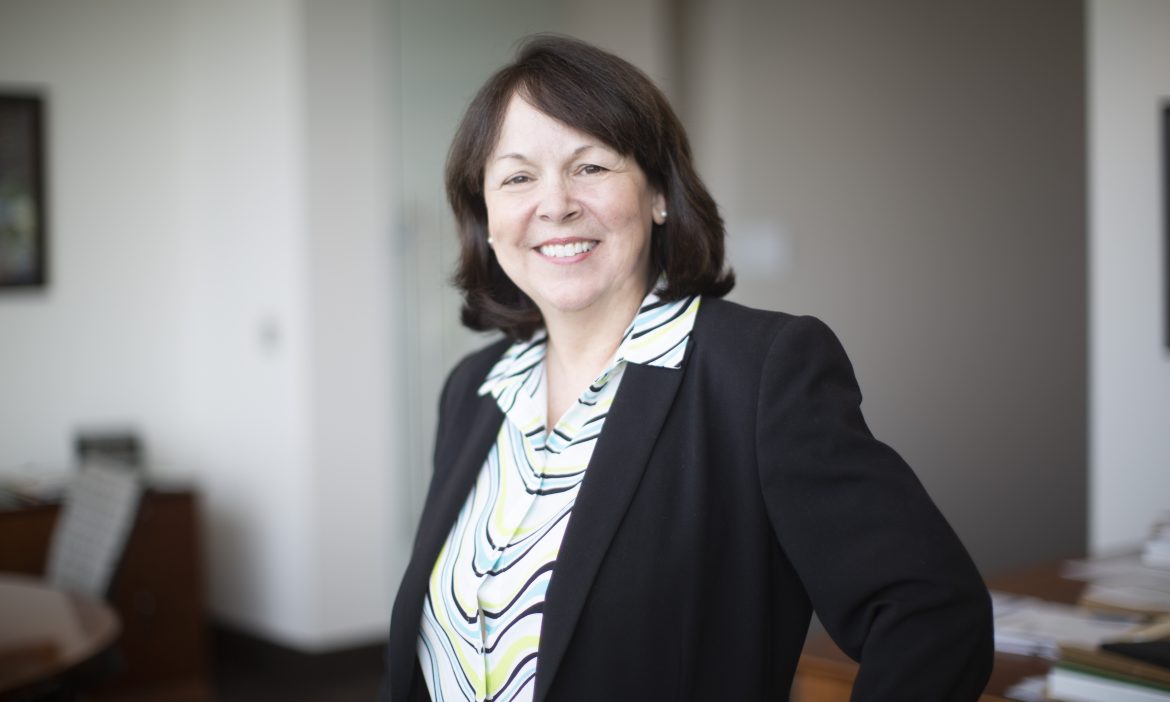An unprecedented pandemic and passionate calls for social justice have resulted in extraordinary change worldwide. BlueCross is no exception to these changes, and it’s meant rethinking ways we collaborate to best serve our members — and ensuring our employees are healthy, engaged and set up for success.
We asked Karen Ward, chief human resources officer at BlueCross, to share how we’ve kept employees connected, and how we’ve been able to respond and adapt to multiple challenges this year.
How would you describe the workplace culture at BCBST?
Karen: Every day, our 6,800 employees and our leadership team make customer service a priority, because it’s built into our mission – peace of mind through better health – and deeply embedded in our company culture.
We place our members’ interests at the center of all decisions we make. To make that a reality, our employees have to share a set of core values, embrace our mission and understand how they contribute.
This starts with consistent communication from our senior leadership team, including openness about our decision-making and how those decisions affect our members.

We make all employees active participants in that process by placing tremendous emphasis on our company culture. And as an intentionally inclusive employer, we strive to make sure every voice is heard, and every voice is valued. We do that by providing opportunities for an open exchange of dialogue and ideas via our employee Town Hall sessions, cultural heritage celebration events throughout the year, and more. Recently, based on feedback we received via our internal share@work idea platform, we made Juneteenth a company holiday.
Employee engagement is an essential part of our success, and we’re proud to have a historically high engagement survey score of 96% this year. It speaks to the dedication and meaningful work our employees do as individuals and within their teams, and the inclusive culture we’ve built together.
Why is it so important during this time to keep the focus on workplace culture?
Karen: This culture has taken decades to develop and is woven into every facet of how we do business and serve our members.
We can’t provide for our members unless all of our employees know how vital each and every single role they play is to this operation.
No matter where their office or workspace is right now, they’re providing exceptional service and work performance that our members, groups and providers need. Ours is a culture of competency and compassion, and it’s vital to celebrate all our employees and the heart they put into their work – no matter where they work.
What are some steps we’ve taken to maintain that culture as our employees have transitioned to working from home?
Karen: We realized even before the first COVID case was confirmed in Tennessee and working from home was on the horizon that we needed to rethink employee communication in the short- and long-term.
We instituted manager training on how to lead virtual teams and welcomed outside speakers like retired Col. Nicole Malachowski, the first woman Thunderbirds Air Demonstration pilot in the U.S. Air Force, to share how to overcome and embrace challenges. We also transitioned events like Hispanic Heritage Month and Veterans Day to virtual settings, and encouraged leaders to find ways to use technology to keep team members connected. Not being able to see each other in person has of course been difficult, but virtual meetings allow us to have that crucial face-to-face time, even from afar.

We’ve also shifted toward more storytelling about our employees this year, both internally and externally, as we celebrated our 75th anniversary. And our internal “Good News Blue” video series, modeled after John Krasinski’s “Some Good News,” helped our people stay connected in creative and fun ways.
What was the biggest challenge we faced early on? What about as the pandemic progressed?
Karen: Collectively, we were all dealing with stress that accompanies a pandemic, and trying to determine new routines and how long they might last. Peace of mind was especially hard to come by in those first few weeks. Like everyone else around the world, we were trying to gain a firm understanding of COVID-19.
We know a lot more now, but we had to change the way we work together very quickly, and ensure our employees knew how important their own health was to the company.
As the pandemic has progressed, our biggest challenge has been balancing the safety of our employees with differing perspectives on returning to the office.
Over half of our employees have raised their hand to say they want to telecommute moving forward, but we also understand a large group is eager to be back in the office, and others want to come back but don’t yet feel safe doing so.
We’re committed to keeping our work environment healthy and safe, and balancing employees’ needs with those of our members. That means our return-to-onsite-work plans are subject to change as we constantly monitor the latest local, state and federal information on COVID-19.
What opportunities are we providing employees to share their evolving concerns about vaccines, returning to work, etc.?
Karen: I mentioned the BlueCross employee engagement survey. In addition to scoring measures, we also study the growing number of comments and suggestions our employees provide each year – this time, there were nearly 20,000 of them. It’s a significant review process, but senior leadership reads every single comment to see what’s working well and what needs improvement.
We’ve also done other targeted surveys, inviting employees to tell us if they want to shift to permanent telecommuting, and how they feel about returning to the office and when. We’ve used their input to help make decisions.
We want our employees to still hear directly from senior leadership, so we’ve transitioned our employee Town Hall events to virtual sessions. We encourage employees to submit their questions here, as well.

Just as we’ve always been, we’re committed to evaluating employee feedback and taking steps where possible to enhance the employee experience at BlueCross.
What are some additional benefits we’ve extended to our employees to help?
Karen: I keep coming back to the stress factor, but we take our employees’ mental health very seriously. We’ve encouraged them to take advantage of their mental health benefits, such as our Employee Assistance Program, which offers guidance for anxiety and depression, marriage and relationship problems, financial services, etc., and our “Learn to Live” self-guided therapy sessions. We’ve also added online classes about nutrition, and — since our gym remains closed — offer virtual fitness classes.
Parents with school-age children make up a huge chunk of our employee base, and we’ve heard from many of them about the adjustments needed to ensure children aren’t just staying on track but thriving in this learning environment.
To provide help for students and relief for parents, BlueCross made virtual academic tutoring available. This service is also available to employees who are themselves enrolled in college classes.
How have we handled this year’s outside cultural conversations within our workforce?
Karen: Following the deaths of George Floyd, Breona Taylor and Ahmaud Arbery, our CEO JD Hickey released a statement condemning racism in all its forms. It was a personal message from him, but also one he shared on behalf of everyone at BlueCross, to ensure everyone here knew we stand against racism and in solidarity with our communities, our members and our business partners.
We also started a series called Critical Conversations, where supervisors gather their teams for open dialogues to share their experiences and feelings regarding the current state of social justice in our nation.
These conversations can be difficult or uncomfortable, but they are a vital part of our workplace culture and the trust we foster among all of our employees, regardless of age, creed or background.
What does the future hold for our workplace culture in a post-COVID world?
Karen: Our culture will continue to adapt and evolve based on the concerns we hear from our employees. This pandemic has already gone through several phases with accompanying changes to our lives each time, whether it be social distancing, mask mandates, or remaining in our homes. We’re monitoring the data, especially when it comes to the vaccines now being distributed to front-line health care workers.
Some months from now, we’ll be moving forward with plans for a phased-in return for those of us who will continue to work on site in the future. Though many BlueCross employees are eager to return, we’ve heard from many who have concerns, especially as infection rates across the state rise again.
Our goal has always been to protect employees and our ability to serve our members. And while we were hopeful early on to provide the option of working in the office at the start of the year, safety comes first.

I must give credit to our lights-on crew in all of our office buildings, and their work is as vital to serving our members as ever. We’ve taken precautions to help them stay protected, as well.
What does our recent designation as a Modern Healthcare Best Place to Work mean to you personally?
Karen: This kind of recognition is an honor and shows that we’re doing some things right. But what resonates much more with me is when an employee contacts me directly, or would stop me in a hallway, to tell me how much a recent change we implemented or resource we put in place means to them personally.
For me, those are the moments that truly matter, and I am eager for the day when I can resume these kinds of conversations face to face with my fellow employees. I’m sure they’re going to have some individual experiences to share, in terms of what worked for them and what needed more work, and I look forward to hearing them.



 Jesse joined the BlueCross BlueShield of Tennessee corporate communications team in 2017. A Chattanooga native, he has more than 15 years’ experience in content creation, management, and strategy for consumer audiences, including a six-year stint in health care marketing.
Jesse joined the BlueCross BlueShield of Tennessee corporate communications team in 2017. A Chattanooga native, he has more than 15 years’ experience in content creation, management, and strategy for consumer audiences, including a six-year stint in health care marketing.